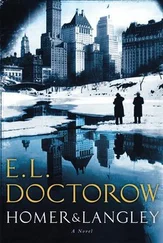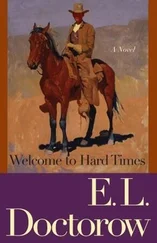“No,” I said. “It’s theirs.”
“I’ll tell you,” Bennett said. “I always respect a man’s decision. Never try to argue him out of it. You’re not staying here and you’re not going home. That leaves you back on the road, doesn’t it? Back on the bum. Well, I say why not, if that’s what you want. But be sure you can handle it. Just be sure you’ve got the guts. So that if you have to steal or take a sap to someone’s head for a meal, you’ll be able to. Every kind of life has its demands, its tests. Can I do this? Can I live with the consequences of what I’m doing? If you can’t answer yes, you’re in a life that’s too much for you. Then you drop down a notch. If you can’t steal and you can’t sap someone on the head when you have to, you join the line at the flophouse. You get on the bread line. If you can’t muscle your way into the bread line, you sit at the curb and hold out your hand. You’re a beggar. If you can’t whine and wheedle and beg your cup of coffee, if you can’t take the billy on the bottoms of your feet — why, I say be a poet. Yes”—he laughed at the thought—“like old Penfield, find your level. Get in, get into the place that’s your nature, whether it’s running a corporation or picking daisies in a field, get in there and live to it, live to the fullness of it, become what you are, and I’ll say to you, you’ve done more than most men. Most men — and let me tell you, I know men — most of them don’t ever do that. They’ll work at a job and not know why. They’ll marry a woman and not know why. They’ll go to their graves and not know why.”
He was standing at the window gazing out with his hands behind his back, gently slapping the back of one hand into the palm of the other. “I’ve never understood it, but there it is. I’ve never understood how a man could give up his life, give it up, moment by moment, even as he lives it, give it up from the second he’s born. But there it is. Bow his head. Agree. Go along. Do what everyone’s doing. Let it leach away. Sign it away. Drink it away. Sleep it away.”
He was standing at the window meditating, eclipsing the window light so that the dark bulk of him was apparent. He was stocky and short-legged with a large head, like a mountain troll. “Well,” he said, “you’re brash enough. Where are you going?”
“I don’t know. As far as I can get.”
He came back to his desk and wrote something on a piece of paper. “You happen to need something — this is a private number, not to be given out, you understand?”
He folded the paper and handed it to me. He gave me a quick glance, one eyebrow arching over the lighted eye of shrewdness. “But don’t leave until I’ve got my dolmen,” he said, turning and picking up his telephone.
The first chance I had I hurried to Penfield’s. He was the only one who could help me with Clara’s escape. That was his word, escape. Clara would leave because she was dislodged by the returning wife, Clara would leave because with unforgivable haste she’d been removed from the cozy confidences of Loon Lake’s master bedroom. But it wouldn’t do to tell him that. He thought he was in torment for her sake. He brooded about rescuing her. That’s the way poets are, I said to myself. They see what no one else can see, and what is clear to everyone else they don’t see.
I found him in bed. His breath rasped. His skin was a strange pink-gray color and it shone in a glaze of perspiration. He stared at me mournfully from his pillows, his blue and bloodshot eyes swimming in helplessness.
Oh God. That was all I needed.
I went out and found Libby in the staff house.
“I’ll have nothing to do with you,” she said.
“It’s not me, Libby. It’s Mr. Penfield. Something’s wrong with him. I think he needs a doctor.”
She looked at me with suspicion. She went ahead of me to the stables and ran up the stairs to keep as much distance between us as she could.
She took one look at the poet and without troubling to remove herself from his hearing said, “There’s nothing wrong with him, he just likes to carry on.”
“What do you know, Libby?” he cried out, stung.
“I know what a hollow leg is,” she said. “Look at this place, it’s enough to make anyone sick.”
“Get out, get out!” Penfield shouted. “Will everyone torture me? Am I to die with the scorn of servants in my ears?”
She ignored him and with a great flurry went into action, picking up papers books dirty socks.
“Go away,” he shouted. “Don’t touch a thing, damnit, you’re disrupting everything!”
She straightened his bedcovers and plumped up his pillows while he shouted at her to leave him alone.
Furious with both of us, she marched out.
“Joe, there’s a bottle of wine under the window seat,” Mr. Penfield said.
I wondered what was wrong with me to be so gullible to the claims of this man. He lived here at Loon Lake sloshing in self-pity, the best aspect of him, his gift for poetry, put to the use of unsound notions. Obviously this was the solution of his life. I couldn’t change that if I tried. Nobody could.
I handed him the bottle and a glass. He sat up.
“Mr. Penfield, I’ve got to tell you something,” I said, pulling a chair to his bedside. “But I need some information first. Who is Clara? Who were those people who came with her on the train?”
“Tommy Crapo,” he said.
“Who?”
“Tommy Crapo. The industrial consultant.” He drank off a half-glass of wine. “Don’t you read the newspapers? Don’t you look at the tabloids? Tommy Crapo who has his picture taken on night-club banquettes with beautiful women.”
Color was coming back to his face. He emptied the glass and lay back on his pillows.
“Is he in the rackets?”
“Mr. Crapo is a specialist in labor relations. Yes. I think that’s a fair description.”
“Does he work for Bennett? Does he knock heads for Bennett?”
He stared at the ceiling. A moment passed. “Why do you ask? You think I should get Miss Lukaćs away from here, don’t you?”
“Well, she’s ready.”
“What?” He was not used to being taken at his word. He was not equipped for action.
“Miss Lukaćs is ready to get out of here,” I said.
“What?”
“She’s ready to make her escape.”
I have committed many sins in my life. This precise sin — the sin against poets — is without absolution.
He was out of bed and struggling into a worn maroon robe that had a few tassels left on the belt. I could hear each breath he took. He got on his knees to look under the bed for his slippers. He found them, stood, stepped into them, and then went slapping across the floor, back and forth from one corner of his apartment to another without purpose or intent but busy with agitation.
I sat him down in his reading chair and brought him a cigarette and lit it for him, he held it between thumb and forefinger, his hand shaking.
“What did she say?” he asked.
“She wants me to get her away.”
“You?”
“She thinks if you leave together, you’ll be too easy to follow. Like a hot car.”
“What?”
“Crapo doesn’t know me from Adam.”
“Crapo is back?”
“He’s on his way, Mr. Penfield.”
“I see. I see.”
“Miss Lukaćs says once she’s safe she can get in touch with you.”
“She said that?”
“I’ve worked out a plan but I need money and I need a car.”
“Yes, yes, so that’s the way it happens. I see. I see.” He was not fooled, he was not a fool, the large protuberant eyes stared through me. “Yes, yes. To be absolutely realistic I’m not in the picture. That’s all right, it’s just, I’m reconciled. The two young ones. Yes.”
Читать дальше











